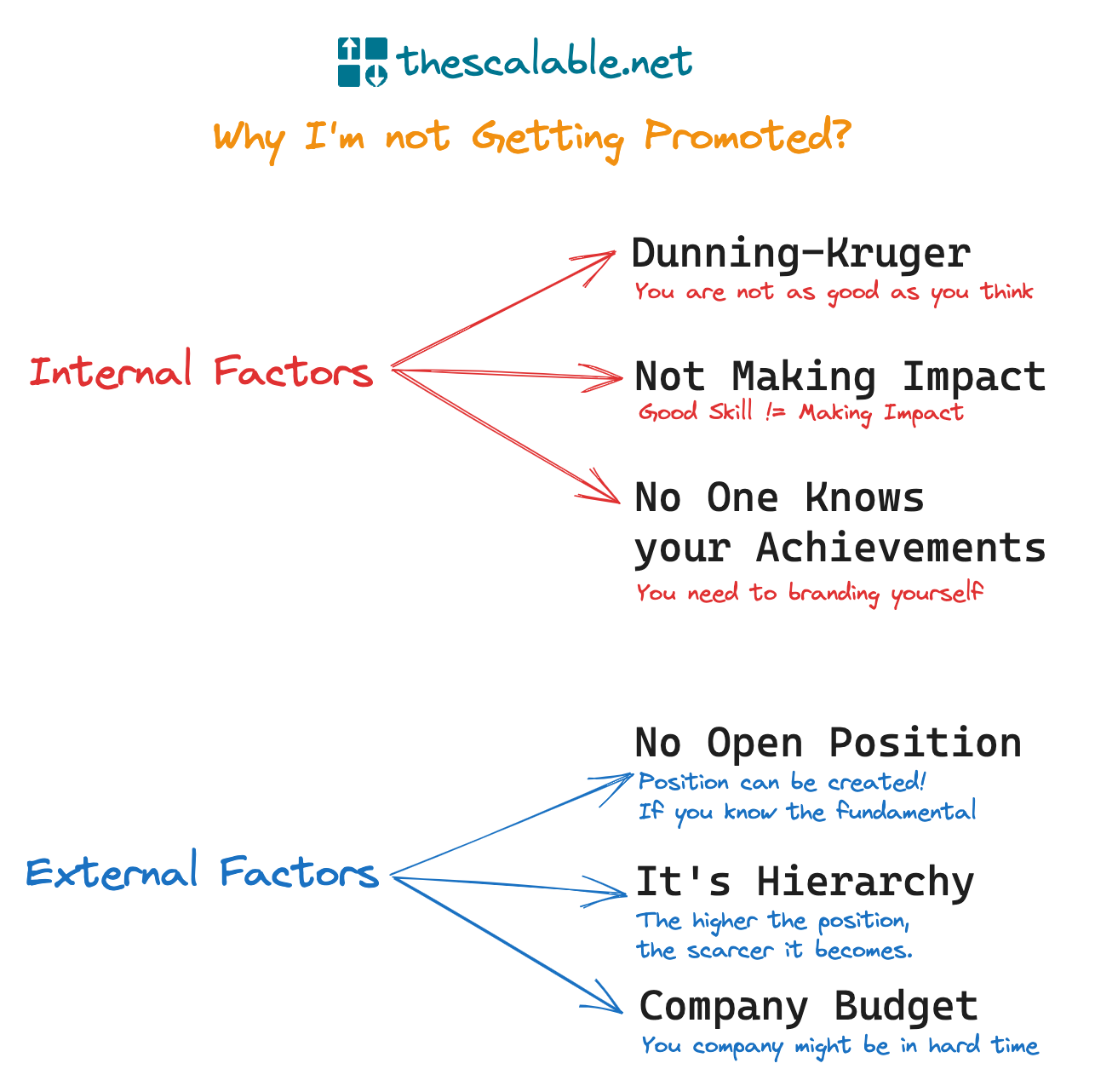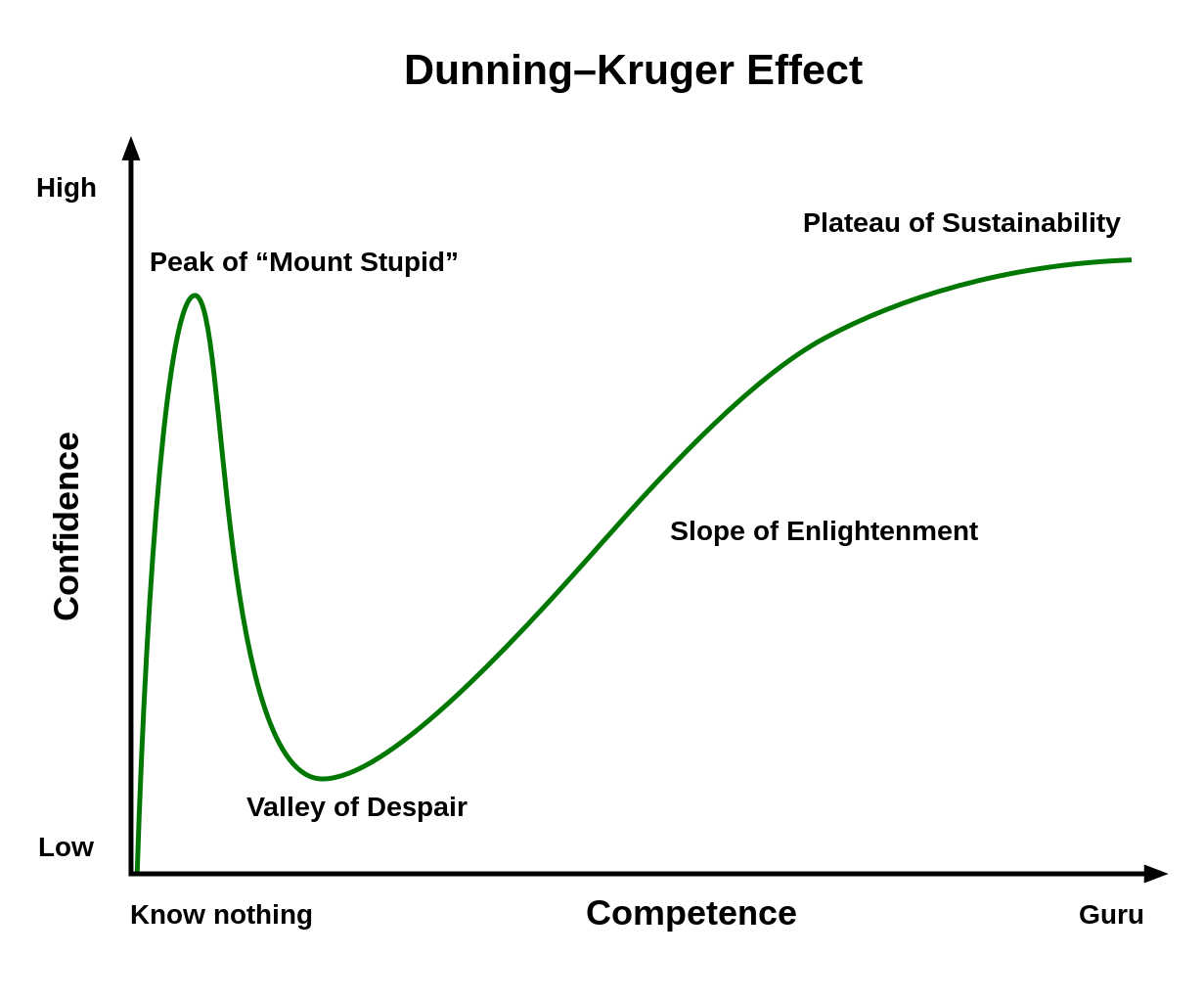Why Everyone is Getting Promoted but Me?
Answering Why Everyone is Getting Promoted but Me? fundamental of why software engineer getting promoted: internal factors and external factors
Welcome to The Scalable, blog and newsletter to help you faster in getting promoted into tech lead position. We are release new content 1-2x a week.
Before we start, kindly to subscribe, follow me on Twitter & Linkedin and share this content to your friends. Enjoy.
Quick Links:
Intro
Why is Everyone Getting Promoted but Me? I have met many software engineers who ask this question. They feel that it is difficult to get a promotion in a Software Engineering career (especially below senior level). The career journey of these individuals typically unfolds as follows:
They join the company with high spirits and strive to become valuable assets.
1-2 years pass, and they start feeling that they should be getting promoted, but they aren't. The reasons given by the company and their managers are unsatisfactory.
More year pass,
Some of them leave the company and go back to square one.
Others lose hope and accept their fate, becoming zombie engineers.
Some choose to stay but become toxic to the company.
We've just lost a potentially great software engineer.
But, is it really difficult to get a promotion in a Software Engineering career? Or perhaps you just don't know how? I have also seen many people who easily get promotions, including those whom I mentored, helping them get promoted 4x in two years, from Mid Level to Staff level (equivalent to a tech lead and an entry-level engineering manager). Whats different?
In this article, we will discuss the fundamentals of why a software engineer gets promoted. I hope this will help you realize that growing your career requires a strategy. Essentially, I will break it down into two sections:
Internal Factors. (Please focus on this section)
External Factors.
Internal Factors
1. Dunning Kruger
The Dunning-Kruger effect is a psychological phenomenon that refers to the tendency of individuals with low ability and knowledge to overestimate their competence and believe they are more skilled and knowledgeable than they actually are.
Real example: Remember when the early version of Chat GPT was released? Many people suddenly labeled themselves as AI experts.
The Dunning-Kruger effect can create a gap where an engineer may feel they deserve a certain position while others, including their managers, may hold a different opinion.
Solution:
Be honest to yourself
Seek feedback
Always improve yourself both hard skills and soft skills. As you acquire more skills and knowledge, the effects of the Dunning-Kruger phenomenon will gradually diminish
2. You are not making an Impact
You are not affected by the Dunning-Kruger effect and you are skilled in software engineering. Such as:
You have completed numerous coding challenges,
Obtained a master's degree in computer science,
Your skills are respected by others.
However, you still have not been promoted while your friend has. How could this be?
Good Skills != Being Impactful
To understand more, let’s consider this case study:
If you are a startup company focused on rapidly releasing new products to achieve Product-Market Fit (PMF), wouldn't it make more sense to promote SEB instead of SEA?
Solution:
Expand your domain knowledge and understand the company's business, recognizing how your skills can make an impact.
Be flexible and adaptable.
Identify the requirements for the position you aspire to. If there is an engineering rubric or framework available, refer to it for guidance.
3. No One know your Achievements
Now that you have acquired sufficient skills and are making an impact in the company. What other reasons could be preventing your promotion? It's possible that your achievements are not being tracked, and you are unable to effectively communicate your accomplishments to others.
This type of situation often arises in larger companies where the decision-making process for promotions is more complex. .
The manager may perceive the engineer as good but not quite good enough for a promotion.
The engineer may believe they have met the requirements and performed well, yet they are not getting promoted.
Both parties rely on assumptions. The engineer may only recall that they have done good work but forget the specific details.
Consequently, the engineer struggles to effectively communicate and provide an explanation of their achievements.
There’s a gap here. But, is it you manager’s fault? It could be, but I believe that's a negative mindset. If you have a goal, it is also your responsibility to effectively communicate your accomplishments and the reasons why you deserve a promotion.
Solution:
Document your achievements every time you complete projects or reach milestones. Don't wait for the performance review period.
Mapped your achievements with the requirements needed for the next level
Have dedicated sessions during 1:1 meetings to discuss your progress, seek feedback, and address any gaps more promptly.
External Factors
Assuming you have already addressed all the internal factors, I would say you have resolved 80% of the issues that may be hindering your promotion. However, there are still external factors that can prevent you from being promoted. In this case, I recommend you to focus on how to respond the situation.
1. No Open Position
This is a common situation that occurs in companies where you have to wait for your superior to resign in order to be promoted.
Let's get back to the fundamentals: "Why does a position exist?"
A position in a company is created when there is a job that needs to be done. From the company's perspective, if all positions are already filled, there is no need to add more people to the same position as it would result in having individuals who are not assigned any work or responsibilities.
That’s why company is more likely to seek an employee who fits the specific needs of role rather than hiring the best candidate in the industry.
How you should response:
You can always create a new position if you can make the company realize that there is a job that needs to be done but has not been recognized yet. Focus on finding it
Personal Story:
I worked at Tokopedia, the largest e-commerce marketplace in Indonesia, as part of the discovery tribes, with a focus on enhancing product discovery for users.
During my time there, I developed a recommendation system, which was a novel concept at the time. This system had a significant impact on business metrics. As a result of this achievement, I was promoted to a team lead position and given the opportunity to recruit and build a team.
2. It’s Hierarchy
The typical career structure follows a hierarchy, where higher positions become increasingly scarce. It's natural that you are being compared to your peers in such a setting.
Both you and your superior are human, as are the other engineers. Subjectivity can arise when objectivity is no longer applicable, especially when there are two or more individuals vying for a promotion.
Here's how you should respond to this situation:
Understand that your superior might have a difficult time making decisions.
Avoid comparing yourself to others.
Improve your relationships with other people, including your superiors. Be more open and actively build trust. This is an area that is often lacking among software engineers.
If you feel that you are more deserving of a promotion, take a moment to reconsider. It might be attributed to your achievements being untracked or your inability to effectively explain your story.
3. Company Budget
I think this point is quite clear. The most challenging aspect is to have the company communicate these reasons to you.
If this situation arises, you have several ways to respond:
If your company in hard situation:
Don't be egoistic; you need to consider your company's situation
You can request the company to promote you formally with a delayed salary increment until they have more profit or funds available.
Continue to make a positive impact to contribute to the success of your company.
However, if the reasons for not getting promoted are unrelated to the company's financial situation, there may not be much you can do about it.
As a last resort, you may consider exploring opportunities with other companies. Don’t become toxic, maintain professionalism and explain your circumstances.
TL;DR
Focus on internal factors first: improve your hard skills and soft skills, align them with your company goals, and effectively brand yourself by showcasing your achievements.
Be aware that there are external factors to consider, such as the hierarchical structure, lack of open positions, and budget constraints within the company.
Be honest with yourself.
Understand the perspectives of the company, your superiors, and managers.
Avoid comparing yourself to others.
Communicate effectively with decision makers or superiors about the external factors. It may be possible to find solutions or alternatives.
Thank you for reading today's newsletter! If you find it valuable, don’t forget to:







